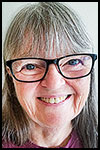Not so easy getting around in new and sightless world
Last spring, Josh Alvey made the move to a new residence near downtown McMinnville. He was accompanied by his wife, Cody, and their 3-year old son.
“We traveled the country extensively over the past several years, looking for just the right place to call home,” he said. “This is definitely one of the best towns we have ever come across.”
But because of diminishing vision, getting around can be a challenge. He tells his story in the following Q&A, compiled by longtime local resident Ellie Gunn:
Ellie: What led you and Cody to look for a new home?
Josh: We began traveling 10 years ago because I have an inherited degenerative retinal disease that is causing me to go blind. We decided to give up many standards of success in order to see as much as we could before I couldn’t see anymore. From coast to coast and 40 states later, we are calling McMinnville home.
Ellie: When did you start losing your vision?
Josh: As a child I was diagnosed with retinitis pigmentosa, which has slowly taken my vision since then.
At 23, I was considered legally blind, because my peripheral vision was so restricted. Now, at 41, I have less than 5% of my total vision, which is like looking through pinholes.
There is a big difference between being partially blind and totally blind.
Many people who are considered blind have some degree of sight. This is usually such a slight amount that it is not considered functional vision.
I am learning how to do many things as if I were totally blind, which requires using other senses.
Ellie: I’ve lived in Yamhill County for 45 years, so I know a lot of people and feel very comfortable walking along Third Street on a sunny day and seeing friends. But what about you, Josh, when you can barely see?
Josh: As a new resident of McMinnville, trying to introduce myself, I’m reminded of Joe Cocker singing the Beatles song “With a Little Help from My Friends.” It starts, “What would you do if I sang out of tune…?”
It’s always tricky moving to a new town with new people and places and trying to find a way to fit in. So, “Lend me your ears and I’ll sing you a song … ”
Ellie: I’ve walked downtown with you. I don’t feel safe crossing First and Second streets at Ford, even though I’m able to tell whether cars are stopping for me or rushing on past. How can you manage without a sighted person helping you?
Josh: It’s something I need to learn how to do.
This past August, the Oregon Commission for the Blind set me up with a mobility instructor so I could learn how to use a white cane to help me walk safely. I’ve been walking around downtown since, learning how to navigate the area.
It has been helpful, but also difficult and scary. It’s not easy to close your eyes and walk toward traffic with just a cane.
But with practice, I’m learning how to use my other senses to hear and feel the world around me, instead of using my eyes.
Ellie: Do you know anyone else going through the same process?
Josh: There are undoubtedly other blind and low-vision people in our community. However, I don’t know any of them.
I have found it very hard to get to know other blind people. Even though I am one of millions of people losing their vision, I am not part of any blind community or friendship group.
For me, being blind is very lonely. Other people, even my family and friends, can’t really understand the difficulties I’m going through, along with the hardships it entails.
Ellie: How can we all help, Josh?
Josh: If you see me on a corner, trying to figure out where I am, listening for cars coming and trying to decide when it is safe to cross a street, please “Stand By Me.”
Helping a blind person is called being a human guide. There is a universal set of rules that make it easier for you and a blind person to work together.
The main thing is, don’t just grab the arm of a blind person and say, “Let’s go.” Ask if they need help, if they are ready to cross the street or find the door to a local business. Or say, “I’m going to the coffee shop if you want me to walk with you.”
Ellie: I think the people in wheelchairs face some of the same challenges, especially trying to negotiate Third Street. Being blind must make it even harder.
Josh: It takes a lot of brain power to keep all the information going while caning. It’s easy to get distracted or disoriented.
I’m constantly in fear of missing something on the ground or being hit while crossing a street. And each new street has different cracks in the sidewalks, tree branches hanging below the required eight-foot clearance, driveways where cars may be parked and, of course, curbs.
Also, there are obstacles like business signs on the sidewalk, tables and chairs in front of restaurants, people on bicycles or skateboards. Those with vision can see those things as they walk, but blind people can’t.
So if the people of McMinnville can help by watching out for me, “I’ll get by with a little help from my friends.”
Josh Alvey grew up in Louisville, Kentucky. He earned earn a bachelor’s degree in public health, then marry and start a family. Now a stay-at-home dad, he and his wife, Cody, have settled on McMinnville as their new home.














Comments